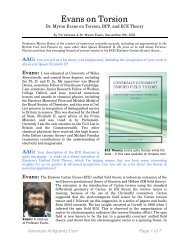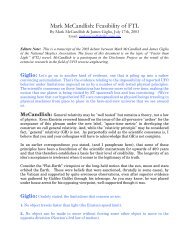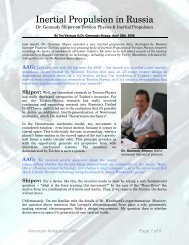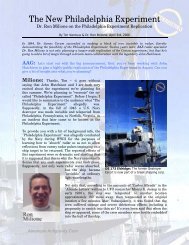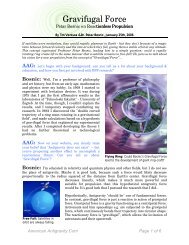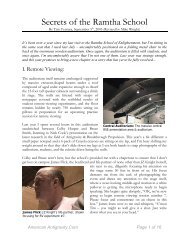Sharon-Weinberger-In.. - American Antigravity
Sharon-Weinberger-In.. - American Antigravity
Sharon-Weinberger-In.. - American Antigravity
Create successful ePaper yourself
Turn your PDF publications into a flip-book with our unique Google optimized e-Paper software.
<strong>Weinberger</strong>: I think most of them are below the administration’s radar screen, and that<br />
perhaps is part of the problem. Top officials are focused on Iraq. So, it’s more a problem of<br />
neglect.<br />
AAG: What role does general fear, uncertainty, and doubt (FUD) about enemy capabilities<br />
play in pushing through otherwise untenable technologies? I mean, it seems like some of these<br />
initiatives are really sold on the idea that "somebody might beat us to it", which seems to play<br />
into a culture of generalized anxiety in the defense industry. Any thoughts on this?<br />
<strong>Weinberger</strong>: That’s a huge, huge driving<br />
factor in a lot of what the Pentagon does. Just<br />
about every defense technology official you’ll meet<br />
will say, “My job is to prevent technological<br />
surprise.” And then they’ll talk about Sputnik,<br />
Japanese torpedoes, Soviet subs, etc. All those<br />
things that “surprised us” in one way or another.<br />
But when you look at the things that surprised us,<br />
you have to think about why they surprised us. It<br />
wasn’t typically things that we thought violated the<br />
laws of physics, but rather technological advances<br />
that competitors had made and where our<br />
intelligence wasn’t very good. So, when we speak<br />
about the hafnium bomb and competitors, we have<br />
to ask: is this an intelligence problem or a physics<br />
problem?<br />
AAG: Speaking of FUD, I've heard rumblings<br />
about China being the next "Soviet Union", and I'm<br />
wondering if you have any thoughts on this aspect<br />
of military programs driving foreign policy? Could<br />
there be a "trickle-up" effect from the defenseindustry<br />
to the administration pushing this anxiety<br />
into the foreign policy area?<br />
DTI 2006: A focus on radar coverage in<br />
Jan/Feb 2006, a bimonthly AvWeek feature.<br />
<strong>Weinberger</strong>: Organizations operate like human beings—they want to grow, become<br />
richer, and live forever. The China threat might indeed be real, but certainly I see a tendency to<br />
hype their capabilities in specific areas as a convenient way to garner support for favored U.S.<br />
defense projects. But is the tail wagging the dog, as your question suggests? That I’m not so sure.<br />
Rather, I think those with interests in these technologies are simply happy to play upon an<br />
existing belief within the current administration.<br />
Just for the record, I think the notion of a “military-industry complex” is misunderstood. This<br />
idea presumes much more power than these industries have. The influence is less at the<br />
strategic level and more at what I call the tactical level (i.e. the revolving door of defense officials<br />
who move into private employment and vice versa).<br />
AAG: Do you think that our military intentionally inflates their claims about enemy<br />
capabilities to sustain their budgets? I think that the difference between the cold-war picture of<br />
the Soviet Union and the reality of their defense-capabilities was shocking to most people, and<br />
I'm wondering if this might have been intentional, or just a runaway side-effect of selfreinforcing<br />
perceptions about the unknown?<br />
<strong>American</strong> <strong>Antigravity</strong>.Com Page 6 of 11



